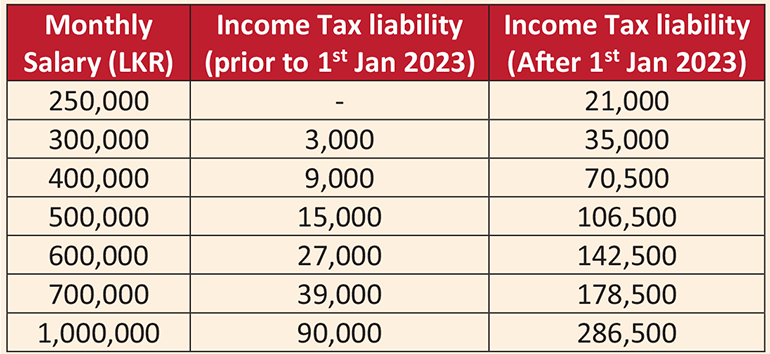Tuesday Feb 17, 2026
Tuesday Feb 17, 2026
Thursday, 5 January 2023 01:34 - - {{hitsCtrl.values.hits}}

Although the fact that the mandatory deduction of tax monthly by the employer eases out the burden on the person and maybe a welcome move, the increased tax deduction maybe something more than one wished for in the new year

The year 2023 is the year of the White Rabbit as per the Chinese calendar and is a symbol of longevity, peace, and prosperity. But for Sri Lanka, as the New Year dawns there are many changes one can anticipate in the tax arena and may be considered a ‘Year of Taxation’.
The Inland Revenue Amendment Act No. 45 of 2022 was certified by the Speaker on 19 December 2022 confirming the revisions to tax regime applicable to both individuals and corporates. The revisions in relation to tax rules on personal income tax is effective from 1 January 2023 and one maybe happy it was not from October 2022 or December 2022 as it was previously planned, though commencing the year with high taxes on the horizon is not how one will wish to welcome the new year.
The significant changes that are introduced in the Personal Income Tax arena with effect from 1 January 2023 in a nutshell are as follows.
Personal relief
While till 31 December 2022, every person enjoyed a personal relief of Rs. 3 million, from the dawn of the new year (from 1 January 2023) the personal relief is reduced to Rs. 1.2 million per annum. Hence any person with taxable income of over Rs. 1.2 million per annum (from any source other than where an exemption applies) is obliged to pay income tax and file a Return of Income.
Progressive tax rates and slabs
With effect from 1 January 2023 the income tax rates will apply on a progressive basis for slabs of Rs. 500,000. Therefore, for each Rs. 500,000 slab, the personal income tax rate of 6%, 12%, 18%, 24%, 30% and 36% will apply.
For clarity if we take a scenario of a person who has taxable income of Rs. 1,900,000 per annum, the exposure to income tax is on the income over and above Rs. 1.2 million. Accordingly, income tax rate of 6% is applied on 500,000 and 12% on Rs. 200,000 and the total tax to be paid would be Rs. 54,000 (on taxable income of Rs. 1.9 m on the assumption no other relief/exemption is applicable). While prior to 1 January 2023, a person with taxable income of Rs. 1.9 million (a taxable income below Rs. 3 m) was free from income tax.
Expenditure relief
An expenditure relief of Rs. 1.2 million per annum was available to a person to take as deduction against the taxable income, however this expenditure relief is withdrawn from 1 January 2023. The expenditure relief was granted for the following identified expenditure and now for the year ending 31 December 2022 only Rs. 900,000 could be claimed as an expenditure relief on a pro rata basis.
Expenses in education, health and interest paid on housing loans are incurred by many on a routine basis. A deduction for such expenditure in computing the taxable income encourages one for voluntary compliance and eases the tax burden. While the expense relief may have been removed with the intention of increasing State Revenue, the expenditure relief would have been a motivating factor for a person to file a Return of Income and be self-compliant. Where the State sector is not able to meet the needs of everyone, where a person is managing such expenses on their own (such as health, education and housing (loan interest), the Government should at least provide relief is a personal opinion of the author.
 Mandatory APIT deduction on employment income
Mandatory APIT deduction on employment income
As all taxpayers are aware, the Pay as you earn (PAYE) tax system in operation prior to 1 January 2020 provided for all employers to register with the Inland Revenue Department, deduct income taxes from the regular profits of employment of liable employees and remit such taxes deducted at source on a monthly basis to the Commissioner General of Inland Revenue. This ensured the State Coffers and the Consolidated Fund receiving a steady stream of tax revenue in an extremely efficient manner. The mechanism ensured 12 payments spread across a year, remitted every month to the Government by the registered employer. In order to rectify the blunder of removing the efficient PAYE Tax scheme, the Advance Payment of Income Tax (APIT) was introduced. However, a resident employee had to provide consent to the employer to deduct the income tax (it was not a mandatory deduction).
The latest change introduced with effect from 1 January 2023 is that the APIT will be a mandatory deduction to be carried out by the employer on the profits from employment received by an employee.
Although the fact that the mandatory deduction of tax monthly by the employer eases out the burden on the person and maybe a welcome move, the increased tax deduction maybe something more than one wished for in the new year.
The real impact of the tax deductions will be felt by the working cadre when they receive the salary since the employer will deduct the tax irrespective of the employee’s consent and it will be based on the revised rate of tax. The CGIR has issued the APIT Tables and Guidelines to the employer on the APIT deduction, dated 22 December 2022 and is available on the website of the Inland Revenue Department.
If a person was earning Rs. 250,000 a month when the Personal Relief of Rs. 3 million was available, the employee was not liable to pay any income tax. Hence the Rs. 250,000 subject to social security contributions was available to an employee as the take home pay. From 1 January 2023, the monthly salary of Rs. 250,000 will be subject to an APIT deduction of Rs. 21,000.
Many employment contracts state the salary and does not indicate the take home pay. If a person’s employment contract only states the salary and no indication of the take home pay, one stands to lose in a high tax regime.
The increase of the monthly deduction under APIT is significant and it is important that one plans the cashflow proper since monthly income earners have fixed expenses on a monthly basis. The inflationary effect on prices together with the additional taxes may not leave much in the hands of an employee as a take home pay. The following increase in APIT deduction on certain monthly salary will allow the reader to comprehend the significance of the increase.
The structuring of the remuneration package is vital now more than ever since a mix of cash and non-cash benefits would reduce the profits from employment for tax purposes within the legitimate framework provided by the law and in turn the APIT tax liability. The Quantification of Values for Non-Cash Benefits in calculating Employment Income was also recently issued by the CGIR dated 22 December 2022.
An individual with only employment income which is subject to APIT is not required to file a Return of Income further to the amendment introduced to the income tax law.
Foreign currency remuneration
There have been discussions around whether salaries received by an employee in foreign currency could enjoy an exemption from income tax. The Inland Revenue Act provides for an exemption for profits earned by a person from services rendered outside Sri Lanka where payment is received in foreign currency via a bank. The interpretation of the wording of the said section (item (u) (iii) – Third schedule) is clear that all services including employment services are eligible for the exemption. However due to different approaches practiced by the IRD officers under the previous income tax act, there is ambiguity whether the exemption is clearly granted for the employment services by the IRD officers.
The rationale for the said exemption is to encourage flow of foreign currency income to the Sri Lankan economy through the banking channel. It could be clearly said that the employment service being a type of a service which attract foreign income falls within the rationale for granting the exemption by the Parliament.
It is recommended that an amendment be introduced to item (u) (iii) in the third schedule to the Inland Revenue Act to clarify that the employment services rendered to a person outside Sri Lanka for a payment in foreign currency remitted via a bank is falling within the ambit of the exemption.
This clarity will encourage many foreign employers to provide direct employment contracts to Sri Lankans which would result in increasing the flow of much needed foreign currency to the Sri Lankan economy.
(The writer is Director – Tax and Regulatory at KPMG.)